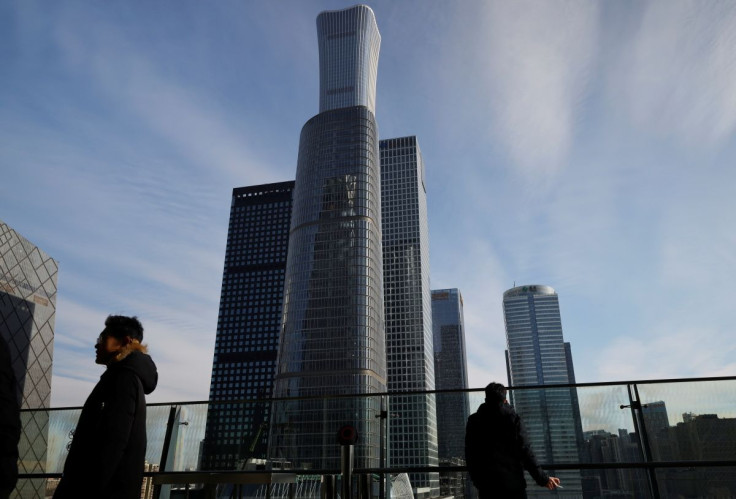China's Economy Revs Up In Jan-Feb; Omicron Cases Dim Outlook

China's economy perked up in the first two months of 2022, with key indicators all exceeding analysts' expectations, although a surge in Omicron cases, property weakness and heightened global uncertainties are weighing on the outlook.
Industrial output rose 7.5% in January-February from a year earlier, the fastest pace since June 2021 and up from a 4.3% increase seen in December, data from National Statistics Bureau showed on Tuesday. That compared with a 3.9% rise expected by analysts in a Reuters poll.
Retail sales, a gauge of consumption that has been lagging since COVID-19 hit, expanded 6.7% year-on-year amid rising demand during the Lunar New Year holidays and Winter Olympic Games. It also marked the quickest clip since June last year and beat expectations of a 3.0% increase in the poll.
It eked out a 1.7% gain in December.
The surprisingly strong performance of the world's second largest economy in the New Year may have enabled the People's Bank of China (PBOC) to hold policy rates steady on Tuesday, Iris Pang, Greater China chief economist at ING, said in a note.
The PBOC kept the rate on its one-year medium-term lending facility loans unchanged earlier in the day, dashing expectations for a cut, although investors believe policymakers may resume monetary easing soon to prop up the cooling economy.
The statistics released combined January-February economic data to help smooth out distortions caused by the Lunar New Year holiday, which fell in early February this year.
One highlight from the data was the strong growth in retail sales, which received a boost from product sales related to the Winter Olympic Games, such as skiing equipment and ice sports, Fu Linghui, spokesman for the statistics bureau, told a press conference.
The mascot Bing Dwen Dwen has been an unexpected star of the Beijing Olympics, with thousands of fans lining up in sub-freezing temperatures to buy merchandise - from magnets and key chains to bags and stuffed toys - and factories scrambling to make more.
The solid numbers came after growth lost momentum throughout last year due to a liquidity crunch in the property market and strict anti-virus measures that hit consumption.
"Indeed, every data point has been rebounding, mainly because policy effects kicked in early this year, with loosening in the infrastructure and property sectors. Catering spending also remained relatively strong," said Qu Qing, chief economist at Jianghai Securities.
However, analysts warn any nascent recovery, which would help China achieve an ambitious target of around 5.5% for 2022, could not be sustained due to surging COVID cases, a weak property market and the uncertain global recovery.
China stocks fell sharply on Tuesday as an increase in coronavirus cases overshadowed the data and threatened the outlook.
"The economic recovery momentum in January-February was good. At the same time, we should also see that the external environment is still complex and severe, and China's economic development faces many risks and challenges," said Fu from the statistics bureau.
Analysts expect the central bank to continue to ease policy to support the economy.
"We should still cut interest rates and reserve requirement ratios as soon as possible. There should not be any hesitation in terms of providing support from loosening policies," said Wang Jun, chief economist at Zhongyuan Bank.
Premier Li Keqiang said last week that he is confident of hitting this year's economic growth target of around 5.5% despite challenges including the war in Ukraine. Li also vowed to provide more policy support in the year.
INFRASTRUCTURE INVESTMENT PICKING UP
Fixed-asset investment rose 12.2% in January-February from a year earlier, compared with the 5.0% increase tipped by a Reuters poll and 4.9% growth in 2021. The figure was the highest since July last year.
Infrastructure investment rose 8.1%, helped by a move to front-load 2022 local government special bonds to this year.
Property investment rose 3.7% from a year in the first two months of 2022, following a 13.9% slump in December, data showed.
The downturn in the property market also showed signs of easing, but sales are still mired in contraction while new construction starts fell by double digits.
"We have continued to stabilise land prices, house prices and expectations, and there have been positive changes in the real estate market," Fu said.
China's property market chilled last year as Beijing's deleveraging campaign triggered a liquidity crisis in some major property developers, leading to bond defaults, a plunge in share prices and projects being shelved or left unfinished.
"The resurgence of COVID in multiple provinces poses an additional drag on activity growth. Despite local property policy easing, property indicators, in particular new starts and land sales, deteriorated further. More policy easing would be required to achieve the challenging 'around 5.5%' growth target this year," analysts at Goldman Sachs wrote in a note.
The nationwide survey-based jobless rate rose to 5.5% in February, up from 5.3% in January, but Fu said the rise was largely due to seasonal factors and the rate could drop after March.
© Copyright Thomson Reuters 2024. All rights reserved.




















